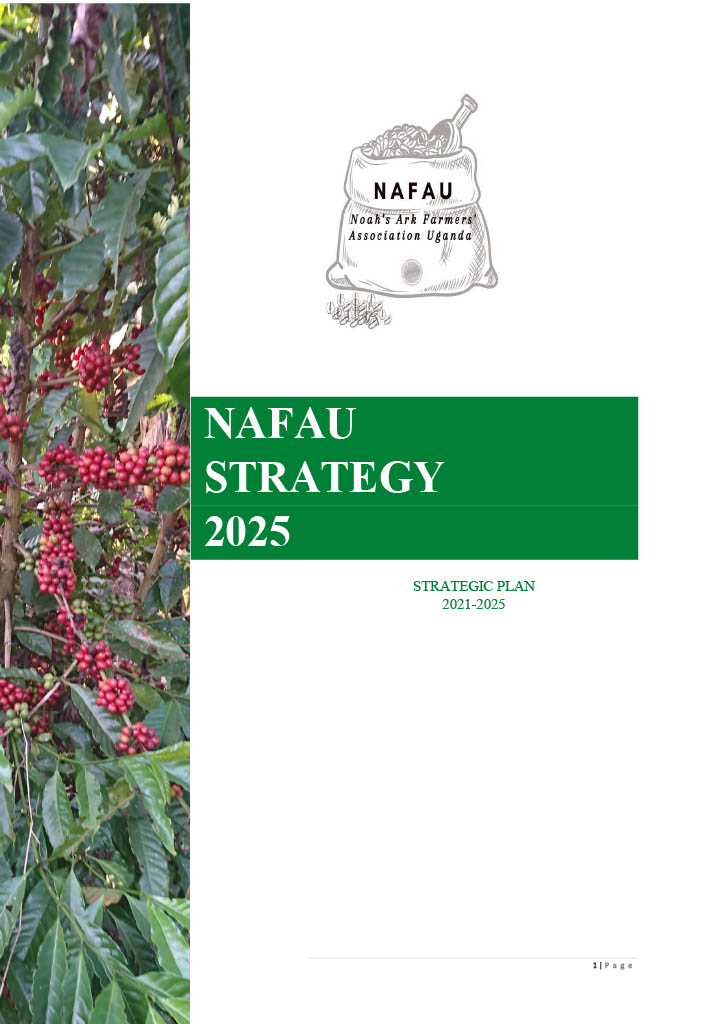
In 2021, NAFAU launched a strategy planning process to define our 2021-2025 strategy, which began with an inclusive and participatory approach with its national networks through individual interviews with the Farmers Organisation (FOs), through work shops, with the participation of several stake holders and NAFAU partners. The five-year strategy (2021-2025) is a strategic vision which proposes a coordinated approach of NAFAU interventions for sustainable food and agriculture, which meet the needs and expectations of FOs and the agriculture sector in Uganda. The result of this reflection constitute entry points for an advocacy towards transnational policies, strategies and programs aiming to the transition to an agriculture combining high productivity, economic viability and respect for the environment, while being based on inclusion and social justice.
The five-year strategic plan of Noah’s ark farmers association Uganda. Nafau was formed or started through a participatory and inclusive process which included the community members and farmers.
The process included several key steps: individual consultations of local leader’s, villagers, community workshops, agricultural sectors, key stakeholders and Nafau partner.
Agriculture is the main economic activity in most rural areas of Uganda and East Africa. It contributes to about 24% to GDP, 26% comes from the industry and 43% comes from service sector it all provides employment over 60% of the total population in the country. Woman play and provide the most in agriculture production.
Vast Majority of 70% are small scale farmers in Uganda and are often more productive at substance level due to poor productivity and limited access of market.
In 2020 this already challenging environment saw the advent two key crisis: Covid-19 and locust invasion in Africa and Uganda. The impact is a further decrease in production, limited access to farming inputs, poor prizes, loss of jobs in agriculture and restricted trade
NAFAU Members also analyzed that crisis also provide opportunity. The moment is ripe to truly increase trade, notably with free trade area coming into effects. It is imperative for NAFAU to build on its established office in Kayunga (Kangulumira), its permanent staffs, increasing reputation and notoriety as voice for farmers and access to agricultural forums to advocate and obtain gains for farmers.
Members re-emphasized that the foundation of the organization is to foster farming as a family business and pillar for economic, social and Cultural development. The five year strategy was built on the foundation.
To develop its strategy, Nafau first refined its theory of change. The key element necessary for transforming Farmers in Uganda. Strengthening farmers as entrepreneurs to run farms that ensures Economic, social and cultural development. Providing a conducive environment for agriculture investment, production, marketing and Knowledge management. The role is their for to work on these two key levers at the national and community levels to ensure that all farmers are impacted
We will achieve this aim through an agricultural R&D program that advances three interconnected objectives:
In the planning process, the current trends in Farming were presented with a specific look at the key trends in each region and villages. Below are the key aspects highlighted by NAFAU members and used to determine the organization’s priorities for the next five years.
According to a study agricultural products include food crops (such as plantations, cassava, sweet-potatoes, millet, sorghum, beans and groundnuts and exports crops coffee, cotton, tea and tobacco. Imports of agricultural products being higher than exports, Uganda has a trade deficit in the sector, suggesting there are opportunities for increased production as well as for increased trade.
In a report published by FAO in March 2020, 34 African countries need Economic growth and food assistance due to a deficit in food production and supply as well as a limited market access for distribution. Once again these challenges represent opportunities for the development of domestic production and consumption.
The use of ICTs in the agricultural sector has several proven advantages for producers such as access to information on climate conditions and market conditions, better organisations of agricultural tasks, increase in efficiency, Improved crop management thanks to technological developments such as aerial imaging, weather forecasting, soil sensors, etc
For years, climate change has been significantly reducing agricultural productivity and thus aggravating its challenges with food security for a rapidly growing population. Climate change repercussions are direct not only on production, but on key aspects of the physical environment. For example, the river basins around which most agricultural activities are concentrated have deteriorated considerably in recent years: Nile (-42%)
These changing basic conditions require farmers not only to adapt for production, but also for land tenure and land use. Poor management of which can lead to full-blown conflict, creating further destabilization for farmers.